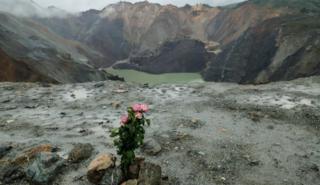

Si Thu Phyo was scavenging for leftover gemstones when he felt the earth shake loose around him.
The 21-year-old was hard at work in one of the world’s largest jade mines, in Kachin State in northern Myanmar. He was just one of hundreds of jade pickers in the pits that day. He tried to run, as the landslide crashed down, but before he could escape he was engulfed by a wave of water, mud, and stone.
Si Thu tumbled under the water. “My mouth was full of mud, the stones were hitting me and the waves pushed me under again and again,” he said. “I thought I was going die.”
But Si Thu swam his way out. Later, in hospital, he learned that seven of his closest friends didn’t. They were among an estimated 200 people who had died in the nation’s worst ever mining landslide.
“We lived like brothers, often sleeping in the same bed,” Si Thu said quietly, recalling his friends.
From his cramped home, which he shares with nine family members, he can see the mountain where he was searching for stones that day.
“I feel guilty for being the one who survived,” he said. “I wish this tragedy is a bad dream and I wake; no landslide and my friends are back.”



Deadly landslides occur almost every year during the rainy season at the vast mines in Kachin state. The mines produce about 70% of the world’s jade – a gem coveted by the Chinese and a trade worth billions of dollars annually.
Last month’s landslide was the deadliest on record. Unlike some that went before, it was captured on mobile phone video. “Social media has made the people aware,” said Si Thu. “When there was no internet and phone connection here, authorities and the companies could turn a blind eye.”

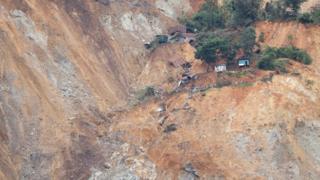

Under pressure, Myanmar’s government appointed an investigative body, led by the Minister for Natural Resources and Environmental Conservation, Ohn Win, to determine responsibility and arrange compensation for the families.
The group’s report now sits with the President. Its findings haven’t been made public yet, but Mr Win has already angered many jade pickers by suggesting those who died were “greedy”.
He said the mines had been officially closed for the monsoon season and the Government had issued warnings about heavy rain. “It was greed,” he said.
The nation’s de facto leader, Aung San Suu Kyi, suggested unemployment levels were to blame.

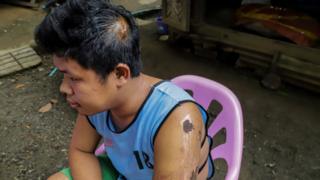

Yan Naing Myo was also in the mines that day. He survived by holding on to an empty oil barrel. Others clung to floating corpses, he said. He was deeply hurt by the words of the environment minister.
“The Government sent them to investigate, but they are just blaming us scavengers,” he said. “It makes us very unhappy at a time when we are in the midst of grief.”
Yan Naing, who is 23, has 14 stitches in his head and extensive bruises on his body. He also has a Bachelor degree in Burmese literature, and he started scavenging for jade in the mines just for “pocket money” at first, during his holidays. After graduating he felt unmotivated and returned to the mines. Now sees it as the only work he can do, he said.
Si Thu didn’t make it that far. He was forced to drop out of school when he was 10, after Cyclone Nargis destroyed his family’s rice paddies and livelihood in 2008.
Now 10 members of the family live together in the shadow of the mines. Si Thu usually wakes around 5am and sometimes works all day, scrabbling for precious stones.

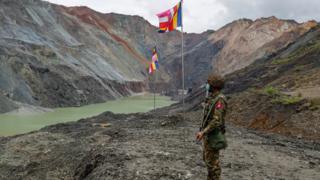

Lawless land
The jade scavengers are driven by unemployment and poverty. Campaigners say they are able to operate in the dangerous territory around the mines because the Myanmar government has limited control over the areas.
“To blame the victims doesn’t address the issues that make it possible for them to be there, which is conflict, lack of rule of law and armed groups,” said Paul Donowitz, lead campaigner with Global Witness, an international watchdog that monitors natural-resource exploitation.


Companies linked to the Myanmar military, or Tatmadaw, largely control the industry and operate in near secrecy, say campaigners. Armed rebel groups, which are seeking self-rule in the region, also extract their own revenues and so do drug kingpins.
“We have found evidence that the ethnic armed groups and the military are even cooperating on the mining fields, while being in armed conflict on the battle field,” said Mr Donowitz.
A nationwide cease fire deal that the central government is trying to reach, he said, “could damage all their economic interests in the mine”.

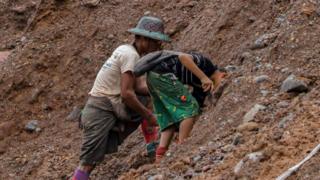

A 2019 analysis by the Natural Resource Governance Institute estimated the value of mined jade in Myanmar at somewhere between $15bn (£11.5bn) annually, but most of it is mined illegally. Official government data puts the annual value somewhere in the millions.
“The state is losing 80% to 90% of the revenue it should be generating,” Mr Donowitz said.
Most of the jade mined in the Kachin state is believed to end up across the border in China. As China has become wealthier, its appetite for the bright emerald stone has soared and at the top end jade can be worth more than gold.

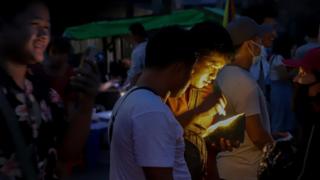

When Si Thu finds a large jade stone, the mining company or the armed groups take a cut, or both. Or in some cases they just seize the stone, he said. “One of my friends found a big precious stone in this mine here,” he said, pointing to where the landslide took place. “But he threw it in the water because he was fed up with how we are treated. We are living a hand-to-mouth existence and never given a chance.”
There is also endemic drug use amongst the miners. Users told the BBC that a shot of heroin cost just $1.
One of four companies that operates in the area where the landslide happened is Kyauk Myat Shwe Pyi, locally known as the Triple One mining company.
U Min Thu, a senior official at the mining ministry and the secretary of the investigation team, confirmed to the BBC that the company is a joint Chinese-Myanmar venture with connections to the Wa Ethnic armed group.
“Armed groups, which have made peace agreements with the government, are allowed to invest in the country,” he said.

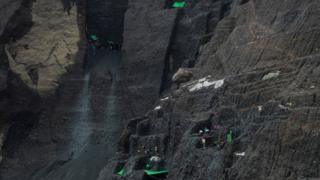

And while a 2019 law prohibits foreigners from investing in jade mining, Chinese mining companies can simply create joint ventures, U Min Thu said. The shares are then divided. “Government owning 25%, and the company 75%,” he said.
In an effort to create greater transparency, the government published information late last year about ownership of mining companies and potential conflicts of interest. But in a new report that analysed the data, Global Witness found only eight of the 163 companies that took part said they had owners with close ties to high-ranking former or present military officials or leaders of ethnic armed groups.
According to the Global Witness report, the entries for the Myanmar military-owned company MEHL were “incomplete and inaccurate”, and the Triple One mining company was not on the list at all.

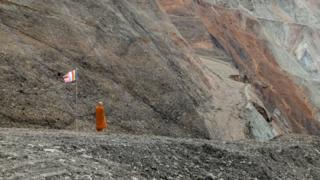

‘Hope is fading’
At the site of the landslide that killed Si Thu’s friends, flowers and incense were placed late last month into the black and grey soil, during at a memorial service for the dead and the missing. The service was led by one of the country’s most prominent monks, Sitagu Sayadaw.
More than 200 monks, along with hundreds of others, chanted Buddhist rites, so the dead could be reincarnated into a better life.

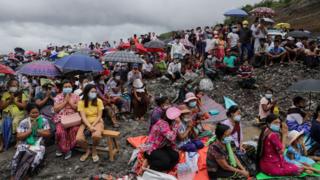

Among the crowd was Daw Mu Mu, who travelled 20 hours from Mandalay to try and find her missing 37-year-old son, Ko Yarzar.
“Every time I hear that another body has been found, I run down into the pits to see,” she said. Her knees were swollen from climbing up and down.
She needs to find her son’s body in order to gain the 3,500,000 Kyat (2,500 US dollars) in compensation that is being offering to families of the decreased by the government and aid agencies.
“I know I have lost him and hopes of finding his body are fading,” she said. “For now, I am just sleeping in my son’s room filled with grief, reviving good memories and consoling myself with the clothes he wore when he was alive.”

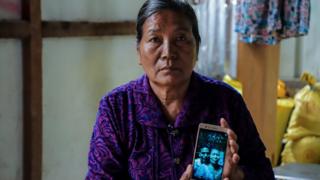

A month after the disaster, people are beginning to return to the mines. Among those making their way back to work are children who toil alongside their parents, searching for the precious stone on the fragile cliffs, knowing all the while that the cliffs could collapse around them.
On a rainy day in July, 10 days after the landslide, Si Thu walked back up to the mine. He was waiting for his injuries to heal. He said he would return to work when they had. Standing at the edge of the pit where his friends died, he stared off into the distance. “Next time I’ll run away before bad things happen,” he said.
Photos by Phyo Hein Kyaw
Click Here to Visit Orignal Source of Article https://www.bbc.co.uk/news/world-asia-53568497


